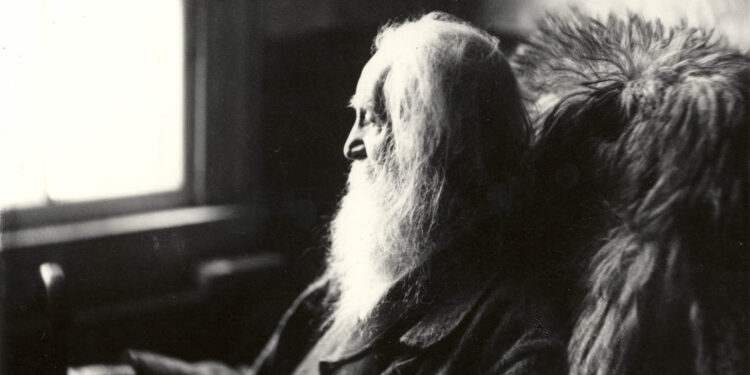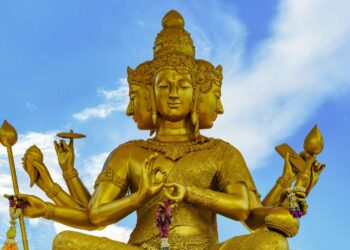Song Of Myself Poem Summary By Walt Whitman PDF
Song Of Myself Poem Summary By Walt Whitman PDF Originally published in 1855, Walt Whitman’s collection Leaves of Grass contains one of the most well-known poems, Song of Myself. The individual, the human body, and the interdependence of all life are all celebrated by Whitman in this expansive poem. 52 sections make up the poem, each of which examines a distinct facet of identity, personal experience, and the universality of life.
Fundamentally, Song of Myself is an ode to the self and the bond between the individual and the cosmos. With a forceful declaration of his own identity, Whitman highlights both his own experience and humanity’s common experiences. He adopts a wide and flexible perspective of the self that is both distinct and all-pervasive.
Whitman explores a number of topics in the poem, including the connection between the body and spirit, the existence of God in all aspects of life, and the unity of all individuals irrespective of their background, ethnicity, or class.
In addition, the poem celebrates freedom, the American experiment’s promise, and nature. Song of Myself is a potent statement of both individual and community identity because of Whitman’s free verse, striking imagery, and celebration of the individual in a democratic society.
Whitman rejects conventional frameworks and embraces an unvarnished, direct relationship with nature, the divine, and his own existence in his poem, which is frequently interpreted as an investigation of transcendentalism. Whitman speaks for humanity as a whole as well as for himself in Song of Myself, making his voice both personal and collective.

Themes in Song of Myself
1. The Celebration of the Self
Song Of Myself Poem Summary By Walt Whitman PDF One of the dominant themes in Song of Myself is the celebration of the individual, which is reflected in the poem’s title. Whitman uses his own experience as a vehicle for understanding and exploring the human condition.
The “myself” of the poem is not just Whitman himself, but also represents every individual. He sees the self as sacred, fluid, and ever-expanding, not confined to social or political constraints.
Song Of Myself Poem Summary By Walt Whitman PDF In the opening sections, Whitman declares that he is not only the person he was born to be but is part of something much larger. He emphasizes the importance of embracing one’s true identity and not being constrained by the expectations of society.
The “self” in the poem is not selfish but rather part of the interconnected whole of humanity and nature. This vision of the self is one that is unique yet universal, constantly evolving and expanding.
2. The Unity of Body and Soul
Song Of Myself Poem Summary By Walt Whitman PDF Whitman’s Song of Myself emphasizes the union between the body and soul. While many religious or philosophical traditions might view the body as separate from the soul, Whitman blurs these distinctions.
He treats the body as sacred, something that is interconnected with the soul and the universe. The poem is full of sensual imagery, focusing on the beauty and joy of the physical experience.
Whitman rejects the idea of separating the physical from the spiritual and sees them as inseparable parts of a greater whole. He celebrates the body in all its manifestations, from its physical pleasures to its impermanence. In doing so, he challenges conventional ideas about religion and spirituality by offering a more holistic view of human existence.
3. Democracy and Equality
Song Of Myself Poem Summary By Walt Whitman PDF Song of Myself is deeply democratic in nature. Whitman believes in the inherent worth and dignity of all individuals, regardless of race, class, or background.
Throughout the poem, he emphasizes that all people, regardless of their differences, share in the same human experience. He often speaks of himself as a representative of all people, breaking down boundaries between the self and others.
Whitman’s democratic vision extends beyond political structures, influencing his poetic style. He rejects the hierarchical, formal conventions of earlier poetry and embraces a free-flowing, expansive verse that mirrors the egalitarian ideals of democracy. The poem suggests that all voices, experiences, and perspectives have value and deserve to be heard.
4. Transcendentalism and the Divine
Song Of Myself Poem Summary By Walt Whitman PDF Song of Myself is infused with transcendentalist themes, influenced by writers such as Ralph Waldo Emerson. Whitman embraces the idea of the divine within nature and within each individual. For Whitman, divinity is not something distant or separate from the world but is present within all aspects of life.
Throughout the poem, Whitman elevates the natural world as a reflection of the divine. He finds spirituality not in religious dogma but in the direct experience of life. The self is part of a larger, cosmic order, and the divine is embedded in the smallest parts of the world, from the human body to the trees and animals.
5. Interconnectedness of All Things
Song Of Myself Poem Summary By Walt Whitman PDF A major theme in Song of Myself is the interconnectedness of all life. Whitman explores the ways in which individuals are connected to each other, to nature, and to the cosmos.
The poem often blurs the boundaries between the self and the larger universe, suggesting that personal identity is not isolated but part of a greater, all-encompassing web of existence.
Whitman expresses the belief that all living things share a fundamental connection, and he speaks for all people, not just for himself. He offers a vision of unity and harmony that transcends the separations between individuals, emphasizing the equality and shared experiences of all human beings.
Line-by-Line Analysis of Song of Myself
Song Of Myself Poem Summary By Walt Whitman PDF Whitman’s Song of Myself is written in free verse, which means it does not follow traditional metrical patterns or rhyme schemes.
This reflects his belief in the freedom of expression and his desire to break away from the rigid structures of conventional poetry.
Opening Stanza:
“I celebrate myself, and sing myself,
And what I assume you shall assume,
For every atom belonging to me as good belongs to you.”
- In these lines, Whitman immediately asserts his identity and celebrates his individuality. He introduces the idea that his identity is not separate from others, suggesting that every individual’s experiences and qualities are shared. The use of “every atom” emphasizes the physical and spiritual connection between all people.
Middle Sections:
“I am the mate and companion of people,
All just as immortal and fathomless as myself;
(You shall not take things too seriously in the next life,
You will see it when you look within.)”
- Here, Whitman speaks of his connection to others, portraying himself as a companion to all people. He stresses that life is to be experienced in its fullness, without becoming too attached to conventional ideas of what is important or real. There is a sense of unity between him and the world.
Later Sections:
“I believe in you, my soul, the other I am,
And whom I have been must be all me—
And I am the servant of that self within me.”
- These lines reflect Whitman’s belief in the soul and its connection to the self. He suggests that there is no division between the soul and the physical self but that the two are interwoven. The lines also highlight his reverence for the soul and his sense of duty to it.
Conclusion
Song Of Myself Poem Summary By Walt Whitman PDF One of the most significant and timeless pieces of American literature is Song of Myself. Whitman examines identity, the oneness of the body and spirit, the interdependence of all individuals, and the divine presence in nature in this vast and audacious poem.
The poem affirms the self in a way that embraces one’s relationship to the world and to other people, rather than in a narcissistic way.
Without being constrained by conventional poetic forms, Whitman is able to communicate his democratic and transcendental aspirations through the literary form of free verse. As a result, the piece feels both personal and collective, intimate and universal. Song of Myself invites readers to discover the divine connection that unites everything and to see past identities.
Whitman encourages us to accept life’s fullness, enjoy who we are, and acknowledge the sanctity of each moment and experience in this poem.
(FAQ)
1. What is the main theme of Song of Myself?
The main theme of Song of Myself is the celebration of the individual self and its interconnectedness with the world. Whitman explores the idea that the self is both unique and part of a greater unity, and he celebrates the human body, the soul, and the shared experiences of humanity.
2. What is Whitman’s view on democracy in Song of Myself?
Whitman’s Song of Myself is deeply democratic, reflecting his belief in the equality of all people. He rejects hierarchical structures and embraces a vision where all individuals, regardless of their background, are connected and equal. The poem emphasizes the importance of individual expression and the collective human experience.
3. How does Whitman approach the body and soul in the poem?
Whitman rejects the traditional separation of the body and soul. In Song of Myself, the body is treated as sacred and integral to the self. The poem emphasizes the unity between the body and the soul, celebrating the physical experience as a reflection of the divine.
4. What is the significance of free verse in Song of Myself?
Whitman’s use of free verse, which does not follow traditional meter or rhyme, reflects his desire to break away from rigid structures. It allows him to express the fluidity and expansiveness of the human experience, aligning with the democratic and transcendental ideals of the poem.
5. How does Song of Myself explore transcendentalism?
Song of Myself is deeply influenced by transcendentalist ideas, particularly the belief in the divine presence within nature and the individual. Whitman sees the self as part of a larger, cosmic order, and he elevates the natural world as a reflection of the divine.
Buy Ignou Assignment
📄 Solved Assignment PDFs – ₹50 each
📘 Exam Guides – ₹300 each
✍️ Handwritten Hardcopies – ₹350 each
📞 PHONE NUMBER – 81302028920 , 88822 85078
🛒 Buy PDFs Online: shop.senrig.in
Read More :
















